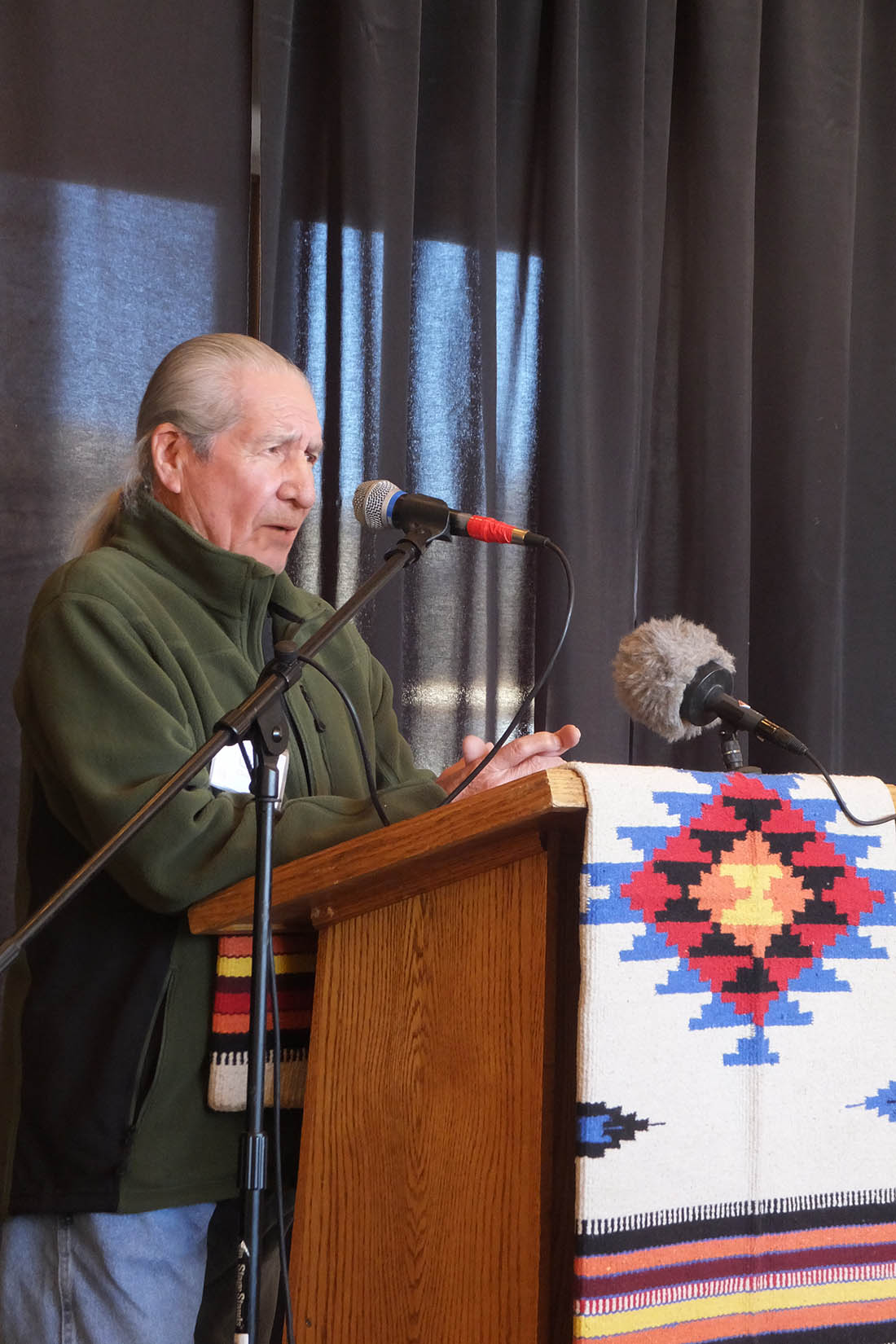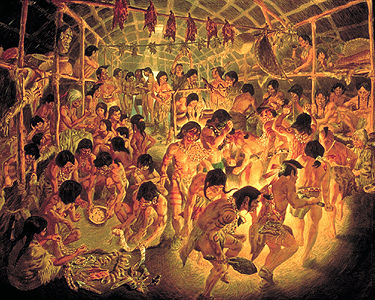Oren R. Lyons Jr. (Onondaga name Jo-Ag-Quis-Ho), lacrosse player, faithkeeper, political leader (born 5 March 1930 in Onondaga Nation, New York). A star lacrosse goaltender on the field and in the box, Oren Lyons is an advocate for the rights of Indigenous peoples around the world. A faithkeeper of the Turtle Clan of the Onondaga Nation, he serves the Grand Council of the Haudenosaunee Confederacy. During the Kanesatake Resistance (Oka Crisis), he served as a negotiator between Indigenous protestors and Canadian authorities. He has received many honours for his advocacy and his athleticism, including induction into Canada’s Sports Hall of Fame.

Early Life and Family Background
Oren Lyons, known by his Onondaga name Jo-Ag-Quis-Ho, was born in Onondaga Nation, south of Syracuse, New York. He was the eldest of eight children born to Winifred Elizabeth (née Gordon) and Oren Raymond Lyons Sr. His mother was Seneca and a member of the Wolf Clan, while his father was Onondaga. Both nations are members of the Haudenosaunee Confederacy. His father, a labourer, was killed when struck by a car in 1956.
Oren Lyons Jr. hunted to provide sustenance for his family, and he dropped out of school in Grade 8 to work. During his late teens, Lyons was an amateur boxer who competed in the Golden Gloves tournament. He was drafted into the United States Army in 1950, joining the 82nd Airborne Division, where he was a member of the boxing team. He continued as an amateur boxer after leaving the service.
Lacrosse
The sport of lacrosse has deep spiritual and cultural importance for the Haudenosaunee. Traditionally, boys were presented lacrosse sticks on their birth, and men were buried with their sticks. The sport is considered a gift from the Creator. “To the Haudenosaunee, it’s much more than a sport,” Oren Lyons told the CBC in 2023. “It’s a medicine game and we’ve been playing it over 1,600 years. In fact, we played it on the other side of the stars.”
Lyons’ grandfather, Isaac Lyons, played lacrosse on the Carlisle Indian Industrial School team alongside the renowned athlete Jim Thorpe. Lyons’ father was a lacrosse goaltender. Lyons was recruited to play goal for a Syracuse University Orangemen team powered by Jim Brown, the future football star. Lyons’ netminding helped lead Syracuse to an undefeated 10–0 season in 1957. That year he was also named the school’s Orange Key winner as outstanding student athlete. He took All-American honours in 1957 and 1958, when he graduated with a fine arts degree.
After college, he suited up as goalie for the New York Lacrosse Club, the New Jersey Lacrosse Club and the Warriors of the Onondaga Athletic Club.
He was a co-founder of the Iroquois Nationals (now Haudenosaunee Nationals) lacrosse team (see also The Iroquois Nationals and the 2010 World Lacrosse Championships). In 1987, the International Lacrosse Federation recognized the team as representing a sovereign nation, allowing it to compete against other national teams.
Working life
Oren Lyons worked as a commercial artist in New York, eventually becoming an executive for Norcross Greeting Cards. It was in that role that he appeared on 14 February 1960 as a guest on the popular television program What’s My Line? The celebrity panelists failed to guess his occupation as a designer of Valentine’s Day cards.
Lyons taught at the University at Buffalo in New York as an American studies professor for nearly four decades.
Advocacy
While protesting the widening of an interstate highway through Onondaga territory in 1971, Oren Lyons befriended artist Yoko Ono and musician John Lennon who were in nearby Syracuse for an exhibition of Ono’s works.
Lyons became a prominent member of the Red Power movement, serving as a leader of a 1972 caravan called the Trail of Broken Treaties. The protest travelled to Washington, DC, to demand the federal government honour treaties with Native American nations.
Lyons went to South Dakota to serve as a mediator during a confrontation between police forces and American Indian Movement leaders, as well as local Lakota residents, during the occupation of Wounded Knee on the Pine Ridge Indian Reservation in 1973.
A prominent speaker on Indigenous and environmental issues, Lyons addressed the United Nations General Assembly in 1992 to mark the International Year for the World’s Indigenous People. He is a leading voice on the UN Permanent Forum on Indigenous Issues.
Kanesatake Resistance (Oka Crisis)
In 1990, Kanyen’kehà:ka (Mohawk) of Kanesatake established a blockade to prevent the expansion of an Oka, Quebec, golf course and townhouse development onto disputed land that included a Kanyen’kehà:ka burial ground. What followed is now known as the Kanesatake Resistance, or Oka Crisis, an armed, 78-day standoff between the Kanyen’kehà:ka of Kanesatake and the Quebec police, RCMP and Canadian Army. The Kanyen’kehà:ka are members of the Haudenosaunee Confederacy. Oren Lyons served as a facilitator and negotiator for talks and negotiations. Ultimately, these negotiations resulted in the dismantling of barricades defended by Kanyen’kehà:ka of Kanesatake.
Chief and Faithkeeper
While a member of the Wolf Clan of the Seneca under the matrilineal system, Oren Lyons was invited to sit on the Onondaga Council of Chiefs as a representative of the Turtle Clan. He is a faithkeeper (spiritual leader) who serves as a spokesperson on a wide range of issues. His role as a faithkeeper was explored by the television journalist Bill Moyers in an hour-long program shown on the Public Broadcasting System in the United States in 1991.

Publications
Oren Lyons has contributed to several books about the environment and Indigenous cultures. As well, he wrote and illustrated Dog Story, a children’s book. He also provided illustrations for other books for young readers.
Awards and Honours
Oren Lyons is the recipient of numerous awards, including an honorary law degree from Syracuse University and the Audubon Medal from the National Audubon Society, for achievement in the field of conservation and environmental protection. He was the inaugural winner of the Art and Cultural Achievement Award from the National Museum of the American Indian. He has also received an Ellis Island Medal of Honor in 1990.
Lyons Hall, a residence on the Syracuse University campus, was named for him in 2007.
Lyons has also been inducted into several sports halls of fame as an athlete or a builder, including:
- Greater Syracuse (NY) Sports Hall of Fame (1988)
- US National Lacrosse Hall of Fame (1992)
- Ontario Lacrosse Hall of Fame (1998)
- North American Indigenous Athletics Hall of Fame (2022)
- Canada’s Sports Hall of Fame (2023)

 Share on Facebook
Share on Facebook Share on X
Share on X Share by Email
Share by Email Share on Google Classroom
Share on Google Classroom




